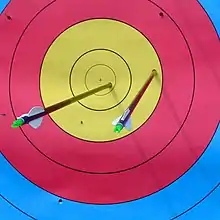arrow
See also: Arrow
English
.svg.png.webp)
An arrow symbol.

Two arrows (projectiles) in a target.
Etymology 1
From Middle English arow, arwe, from Old English earh, arewe, arwe, from Proto-Germanic *arhwō, from Proto-Indo-European *h₂érkʷo- (“bow, arrow”). Cognate with Faroese ørv, ørvur (“arrow”), Icelandic ör (“arrow”), örvar (“arrows”), Gothic 𐌰𐍂𐍈𐌰𐌶𐌽𐌰 (arƕazna, “a dart”), Latin arquus, arcus (“bow”).
Pronunciation
- (Received Pronunciation) IPA(key): /ˈæɹ.əʊ/
- (General American) IPA(key): /ˈæɹ.oʊ/, /ˈɛəɹ.oʊ/, /ˈɛɹ.oʊ/
- Hyphenation: ar‧row
Audio (US, without Mary-marry-merry merger) (file) Audio (US, with Mary-marry-merry merger) (file) - Rhymes: -ærəʊ
Noun
arrow (plural arrows)
- A projectile consisting of a shaft, a point and a tail with stabilizing fins that is shot from a bow.
- 1577, Raphaell Holinshed [i.e., Raphael Holinshed]; Richard Stanihurst, “[The Historie of Irelande.] The Thirde Booke of the Historie of Ireland, Comprising the Raigne of Henry the Eyght: [...].”, in The Firste Volume of the Chronicles of England, Scotlande, and Irelande. Conteyning, The Description and Chronicles of England, from the First Inhabiting unto the Conquest. The Description and Chronicles of Scotland, from the First Originall of the Scottes Nation, till the Yeare of Our Lorde. 1571. The Description and Chronicles of Yrelande, likewise from the First Originall of that Nation, untill the Yeare. 1547. Faithfully Gathered and Set Forth, volume I, London: Imprinted [by Henry Bynneman] for Iohn Harrison, OCLC 55195564, pages 77–78, column 2:
- The Citizens in their rage, imagining that euery poſt in the Churche had bin one of ye Souldyers, ſhot habbe or nabbe at randon[sic, meaning random] uppe to the Roode lofte, and to the Chancell, leauing ſome of theyr arrowes ſticking in the Images.
- 1879, R[ichard] J[efferies], chapter II, in The Amateur Poacher, London: Smith, Elder, & Co., […], OCLC 752825175, page 071:
- Orion hit a rabbit once; but though sore wounded it got to the bury, and, struggling in, the arrow caught the side of the hole and was drawn out. Indeed, a nail filed sharp is not of much avail as an arrowhead; you must have it barbed, and that was a little beyond our skill.
-
- A sign or symbol used to indicate a direction (e.g. ).
- (graph theory) A directed edge.
- (colloquial, darts) A dart.
- (computing) The -> symbol, which has specific meanings in various programming languages.
- (botany) The inflorescence or tassel of a mature sugar cane plant.
- 1921, The Louisiana Planter and Sugar Manufacturer, volume 67, page 187:
- When the bulb of the “blowing ball” is operated, a gentle spray, much like what happens in Nature when a sugar cane arrow is shaken by the wind or gently tapped, is given out at the free end of the capsule and can be directed to any portion of the arrow as desired.
-
Synonyms
- (projectile): streal
- (in graph theory): arc, directed edge
Derived terms
Terms derived from arrow
Translations
projectile
|
|
symbol
|
|
in graph theory — see directed edge
- The translations below need to be checked and inserted above into the appropriate translation tables, removing any numbers. Numbers do not necessarily match those in definitions. See instructions at Wiktionary:Entry layout#Translations.
Translations to be checked
See also
Verb
arrow (third-person singular simple present arrows, present participle arrowing, simple past and past participle arrowed)
- (intransitive) To move swiftly and directly (like an arrow)
- (transitive) To let fly swiftly and directly
- (intransitive, botany, of a sugar cane plant) To develop an inflorescence.
- 1848, Louis Antoine A.G. De Verteuil, Three essays on the cultivation of the sugar-cane in Trinidad, page 12:
- The more vigorous and luxuriant the vegetation of a field of canes, the less will the tendency to flowering be shewn; whereas nearly all the canes will be found to arrow if the soil be poor and the vegetation meagre.
- 1903, Planter and Sugar Manufacturer, volume 30, page 374:
- In some sugar cane countries efforts are made to harvest the cane crops before the period of arrowing, and in Barbados it is thought that a considerable loss occurs in the yield of sugar if the harvest be delayed and only completed through the arrowing season.
-
- (computing, intransitive) To navigate using the arrow keys.
- Arrow left until you reach the start of the text you want to delete.
Etymology 2
Representing pronunciation.
Contraction
arrow
Anagrams
This article is issued from Wiktionary. The text is licensed under Creative Commons - Attribution - Sharealike. Additional terms may apply for the media files.